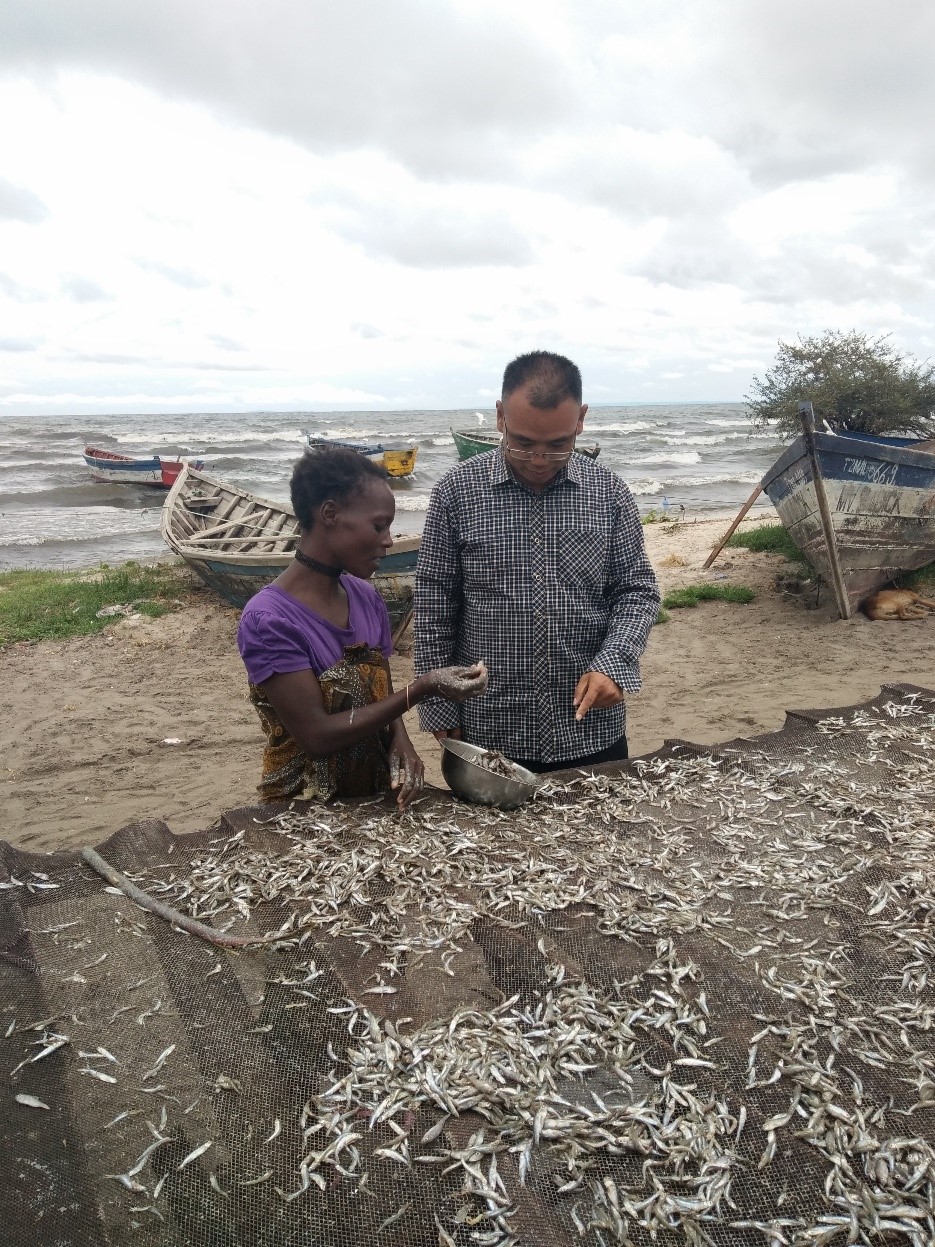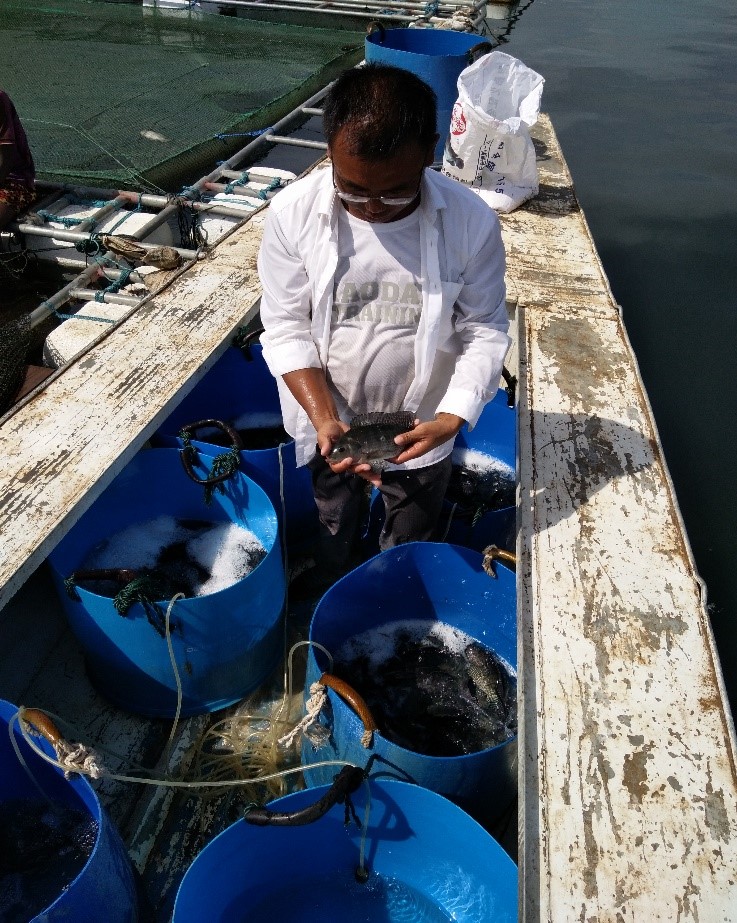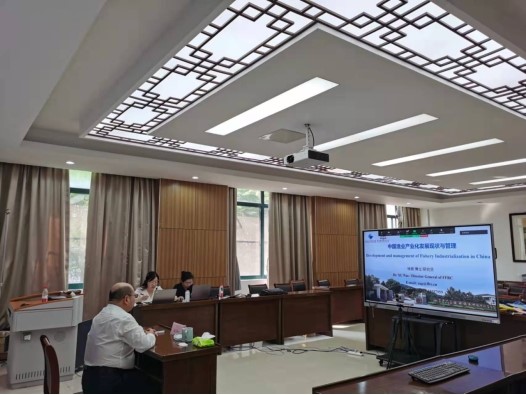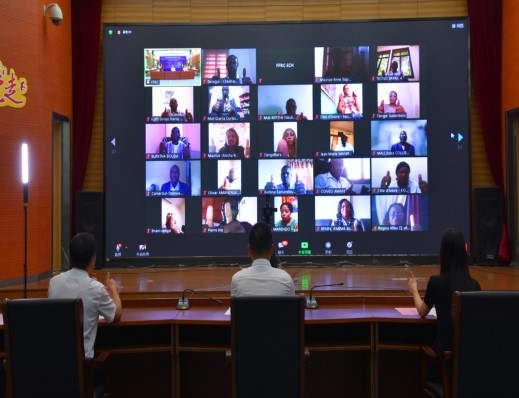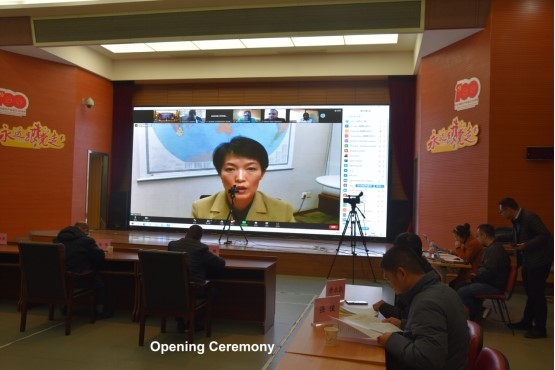 Poverty Alleviation through Tilapia Industry Chain Development in Tanzania
Contributing to sustainable aquaculture development and poverty alleviation through technical consultations and capacity-building programmes among Tanzanian smallholders and technicians
Poverty Alleviation through Tilapia Industry Chain Development in Tanzania
Contributing to sustainable aquaculture development and poverty alleviation through technical consultations and capacity-building programmes among Tanzanian smallholders and technicians

Challenges
Aquaculture plays a key role in providing employment, increasing incomes and ending poverty in African countries. The United Republic of Tanzania is rather rich in inland fishery resources, especially in Lake Victoria, Lake Tanganyika and Lake Nyasa region, and aquaculture has begun to be exploited gradually in the last few decades. Aquaculture in Tanzania has a vast yet untapped potential. The industry is dominated by freshwater fish farming in which small-scale farmers practice both extensive and semi-intensive fish farming. Aquaculture has been identified as the key industry for nutrition intake, food security and social progress from the governments.
Yet, though a large number of rivers, lakes, reservoirs, dams and streams, as well as climatic conditions, are available in Tanzania, the industry has been developing at a quite slow pace, with low production, high mortality and limited quantities, mainly due to some major constraints, e.g. low level of technology and competition from other sectors; an unreliable seed supply; inadequate aquaculture extension services and poor infrastructures; insufficient quality feeds supply; lack of fund for aquaculture and other projects; and subsistence activities apart from a few notable examples.
Towards a Solution
Focusing on the above challenges, the Freshwater Fisheries Research Center of Chinese Academy of Fishery Sciences (FFRC, CAFS), supported by Global South-South Development Center Project and in partnership with Ministry of Livestock and Fisheries of the United Republic of Tanzania, carried out technical extension services, capacity-building training and a consultation and academic workshop in the aquaculture sector. The Tilapia species has been the focus of aquaculture development in Tanzania. Every year, tilapia production accounts for more than 80 percent of the total output of aquatic products in the country, making a positive contribution to the alleviation of poverty and hunger in Tanzania.
This can help increase local smallholders’ income, supply animal protein, promote fishery industry development and create more job opportunities, which are closely in line with Sustainable Development Goal (SDG) 1 (No Poverty), SDG 2 (Zero Hunger) and SDG 8 (Decent Work and Economic Growth). It can also reduce natural fishery resources capture, which contributes to the achievement of SDG 14 (Life Below Water). Through the active participation and joint efforts of various fishery institutions, the authorities and local smallholders, it contributes to achieving SDG 17 (Partnerships for the Goals).
This project was implemented from August 2020 to July 2022. Due to the COVID-19, it was impossible for experts to carry out on-site technical guidance, demonstration, and popularization in Tanzania. The FFRC mission team decided to adopt an innovative cooperation model. To that end, the team successively carried out online survey on aquaculture in Tanzania, established the China-Tanzania fisheries cooperation partnership, compiled tilapia-related technical manuals, trained technical personnel and recruit students for master’s degree for Tanzania thereby achieving the expected results.
Throughout the project, the FFRC team focused on five aspects:
- Increasing the understanding of the real needs of Tanzania in aquaculture development.
- Improving knowledge of local fish farmers and technicians on scientific tilapia farming, through the remote technical consultations and well-targeted and need-based training sessions, scientific methods and techniques which have been shared with farmers and other beneficiaries.
- Increasing the confidence of the local managerial authorities to strengthen support for aquaculture.
- Facilitating Chinese fishery institutions and enterprises to cooperate with local fishery institutions for the improvement of fishery facilities and the development of the feed industry.
- Sharing more funding channels with participants for developing the tilapia industry.
Through the successful implementation of the project, the FFRC mission contributed in the following ways:
- Understanding the technical needs for tilapia industry development in Tanzania. The expert group of FFRC talked with Tanzanian fishery practitioners and managers of China-invested aquaculture enterprises in Tanzania under the coordination of officials from the Tanzanian Ministry of Livestock and Fisheries. The experts also had technical consultations and exchanges with experts from the Fisheries and Aquaculture Division of the Food and Agriculture Organization of the United Nations (FAO), Zhongzhi Tilapia Farming Base in Tanzania, the Fisheries Education and Training Agency and the Tanzanian Embassy in China. They also communicated with local fishery enterprises in terms of the design, water quality and farming facilities of tilapia farms, fully exchanged views with technicians and farmers on tilapia farming, and consulted with officials from FAO and Tanzanian institutions on many local issues.
- Improving the techniques and skills of tilapia production through training, education and consultancy. Two fishery officers were recruited to have a two-year master study in fishery development in FFRC from 2021-2023. FFRC also invited 25 fishery technical and management officials from Tanzania to participate in the online training, covering several key areas, including selective breeding, seed production, feed development, inspection and quarantine, aquatic product quality and fishery development. Moreover, the expert group organized a technical training seminar regarding tilapia in African countries, and invited 52 technicians, scholars and management officials from 13 African countries to exchange ideas with them. In addition, online technical consultancy on farm design and high-yield technology of tilapia for Zhongzhi Tilapia Farming Base in Tanzania was provided by the FFRC team.
- Promoting cooperation through communication and proposals. During the project, the experts of FFRC had in-depth exchanges with the Tanzanian Embassy in China, the Tanzanian Ministry of Livestock and Fisheries, the Zhongzhi Tilapia Farming Base in Tanzania and with other Tanzanian institutions and enterprises, including Dr. Rashid Tamatama, Permanent Secretary (vice-ministerial level) of the Tanzanian Ministry of Livestock and Fisheries. In this way, the experts obtained first-hand information on the technical needs of Tanzania's aquaculture development in real time, and analysed Tanzania's aquaculture development in terms of advantages, disadvantages, opportunities and challenges.
On this basis, the experts prepared a proposal for cooperation. During the training, FFRC also organized a webinar on aquaculture economic and trade cooperation, which showed the technology and products of enterprises to each other and laid a strong foundation for future cooperation.
This project not only solved a lot of local problems and difficulties, but also taught the local farmers and technicians how to conduct tilapia farming scientifically, gradually promoting the local tilapia industry via self-reliance. This serves as a positive example for other developing countries, especially in Africa. It ultimately stimulates the fishery and aquaculture industry thus helping achieve poverty alleviation in Africa.
Contact Information
Countries involved
Supported by
Implementing Entities
Project Status
Project Period
Primary SDG
Primary SDG Targets
Secondary SDGs
Secondary SDG Targets
Similar Solutions
| NAME OF SOLUTION | Countries | SDG | Project Status | |
|---|---|---|---|---|
A Billion Brains: Smarter Children, Healthier Economies High Level Meeting on South-South Cooperation for Child Rights |
United Republic of Tanzania | 17 - Partnerships for the Goals | Completed | View Details |
Accelerator Labs Network Following collective intelligence methods to address emerging sustainability challenges and the growing demand for local solutions |
United Republic of Tanzania | 08 - Decent Work and Economic Growth 13 - Climate Action | Ongoing | View Details |
ACP Business-friendly Supporting business-friendly and inclusive national and regional policies, and strengthening productive capabilities and value chains |
United Republic of Tanzania | 08 - Decent Work and Economic Growth 17 - Partnerships for the Goals | Ongoing | View Details |
Adaptation of 3PA to Urban and Displacement Settings Using South-South and Triangular Cooperation in World Food Programme Three-Pronged Approach capacity strengthening through cross-learning initiatives |
United Republic of Tanzania | 02 - Zero Hunger | Completed | View Details |
ADAPT PLAN in Malawi |
United Republic of Tanzania | 01 - No Poverty 05 - Gender Equality 11 - Sustainable Cities and Communities | Ongoing | View Details |
